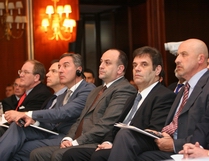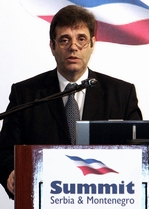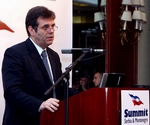- Serbia
Get to know Serbia
- Citizens
Culture and science
Health services
Pension and disability insurance
- Business
Employment
Economy
- Media
- Government
- Contact
Keep in touch
Contact form
Back
Keepin touch
Whether you have a question, comment, suggestion or any problem in the purview of the government, send us your message and we will try to respond as soon as possible. If your problem is not in our purview, we will forward your message to the relevant institution.
Q:
A:
Government will resolve problem of cooperation with the Hague Tribunal
Belgrade,
11 May 2006
Serbian Prime Minister Vojislav Kostunica said today that the Serbian government will resolve the problem of cooperation with the Hague Tribunal so that negotiations with the European Union might continue and the Stabilisation and Association Agreement be concluded by the end of the year.
Speaking at the opening of the sixth Serbia-Montenegrin summit, Kostunica recalled that in the previous period part of negotiations with the EU were conducted successfully, and the issue of cooperation with the Hague Tribunal, more precisely the case of General Ratko Mladic, was the obstacle in the continuation of negotiations.
The Serbian Prime Minister said that the decision by the EU to call off negotiations with Serbia-Montenegro was not a good one, and expressed conviction that all obstacles will be removed in an atmosphere of cooperation and support, and not by halting negotiations.
Kostunica said at the summit, attended by domestic and foreign politicians, diplomats and businesspeople, that the solution for Kosovo-Metohija must be based on compromise and historically just, founded on the respect for international law and democratic values.
Any precedent that is set on the basis of violation of law and which would mean breaking up the country and severing part of its territory would have long-term consequences for the region, warned the Serbian Prime Minister. He reiterated that Serbia favours substantial autonomy for Kosovo-Metohija within the borders of Serbia-Montenegro, while respecting European standards.
The Serbian Prime Minister said that the decision by the EU to call off negotiations with Serbia-Montenegro was not a good one, and expressed conviction that all obstacles will be removed in an atmosphere of cooperation and support, and not by halting negotiations.
Kostunica said at the summit, attended by domestic and foreign politicians, diplomats and businesspeople, that the solution for Kosovo-Metohija must be based on compromise and historically just, founded on the respect for international law and democratic values.
Any precedent that is set on the basis of violation of law and which would mean breaking up the country and severing part of its territory would have long-term consequences for the region, warned the Serbian Prime Minister. He reiterated that Serbia favours substantial autonomy for Kosovo-Metohija within the borders of Serbia-Montenegro, while respecting European standards.
Regarding the upcoming referendum in Montenegro, Kostunica said, “Nothing is more natural than Serbia and Montenegro remaining to live together.”
He said that it is important for the Serbian government that the EU is engaged in the referendum process in Montenegro, and stressed that “there is no grey zone”, in other words any result below 55% will signify the choice of a common life in a common state.
Kostunica said that Serbia has made significant economic progress which is reflected in the report by the World Bank and the International Monetary Fund (IMF), as well as the macroeconomic growth experienced in the first three months of this year.
According to Kostunica, the aim of the Serbian government is to increase exports in the GDP, and realising an influx of foreign direct investment worth $3 billion annually. Serbian authorities are making efforts to create as good business climate as possible, the Serbian Prime Minister said and announced the adoption of new systemic laws and elimination of administrative barriers with the aim of attracting foreign investment.
He added that Serbia is carrying out reform of legislation in order to enter the World Trade Organisation and voiced hope that that will happen by the end of 2008.
Kostunica said that the work on expanding the common regional market is underway through negotiations on a single free trade agreement, which should become effective as of 2007.
He said that it is important for the Serbian government that the EU is engaged in the referendum process in Montenegro, and stressed that “there is no grey zone”, in other words any result below 55% will signify the choice of a common life in a common state.
Kostunica said that Serbia has made significant economic progress which is reflected in the report by the World Bank and the International Monetary Fund (IMF), as well as the macroeconomic growth experienced in the first three months of this year.
According to Kostunica, the aim of the Serbian government is to increase exports in the GDP, and realising an influx of foreign direct investment worth $3 billion annually. Serbian authorities are making efforts to create as good business climate as possible, the Serbian Prime Minister said and announced the adoption of new systemic laws and elimination of administrative barriers with the aim of attracting foreign investment.
He added that Serbia is carrying out reform of legislation in order to enter the World Trade Organisation and voiced hope that that will happen by the end of 2008.
Kostunica said that the work on expanding the common regional market is underway through negotiations on a single free trade agreement, which should become effective as of 2007.
-
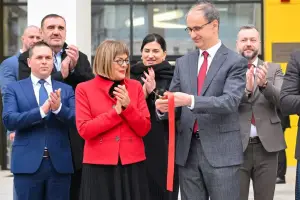 Novi Sad, 26 January 2026
Novi Sad, 26 January 2026Investment in educational infrastructure long-term investment in society’s development
-
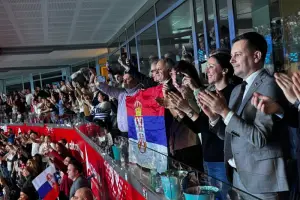 Belgrade, 25 January 2026
Belgrade, 25 January 2026Prime Minister Macut extends congratulations to Serbian water polo team
-
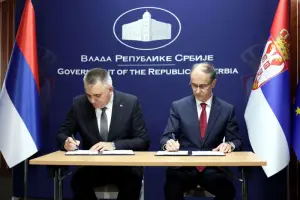 Tara, 24 January 2026
Tara, 24 January 2026Concrete steps towards further strengthening special ties with Republika Srpska
-
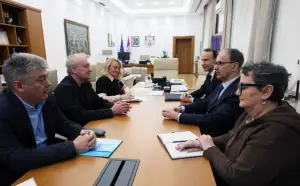 Belgrade, 21 January 2026
Belgrade, 21 January 2026Government remains committed to strengthening social dialogue
-
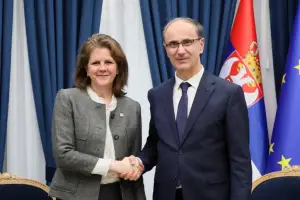 Belgrade, 20 January 2026
Belgrade, 20 January 2026Serbia committed to further constructive cooperation with ICRC
-
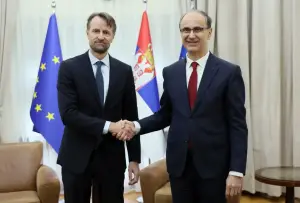 Belgrade, 19 January 2026
Belgrade, 19 January 2026Serbia proposes solutions to mitigate restrictions on drivers’ stays in Schengen Area
-
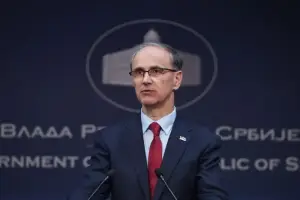 Belgrade, 19 January 2026
Belgrade, 19 January 2026Prime Minister expresses condolences over railway accident in Spain
-
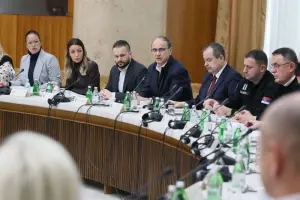 Belgrade, 16 January 2026
Belgrade, 16 January 2026Efficient work of teams addressing consequences of severe winter weather
-
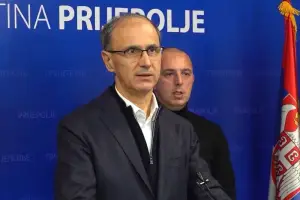 Prijepolje, 12 January 2026
Prijepolje, 12 January 2026State monitoring situation, providing assistance to citizens in affected districts
-
 Priboj/Prijepolje, 12 January 2026
Priboj/Prijepolje, 12 January 2026Situation stabilised in Priboj, Prijepolje

